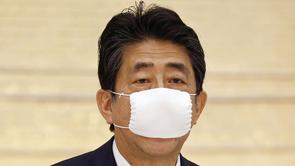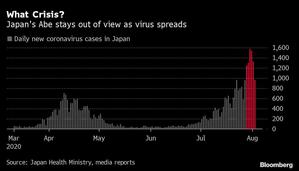 Japan's Prime Minister Shinzo Abe speaks during a meeting of government and ruling party officials at his office in Tokyo, May 27, 2020. (PHOTO / Kyodo News via AP)
Japan's Prime Minister Shinzo Abe speaks during a meeting of government and ruling party officials at his office in Tokyo, May 27, 2020. (PHOTO / Kyodo News via AP)
Japan’s tally of virus infections is shooting up faster than ever, and support for Prime Minister Shinzo Abe is sinking to new lows.
Abe’s government has looked out of sync with public fears, seen by a push to encourage domestic travel with subsidies despite criticism it will spread the virus
While Japan’s total death toll remains close to the number the US sees in a day, the public fears Japan may be sitting on a ticking time bomb. Abe’s approval slid to a record low of 35.4 percent in a poll published by JNN Monday. More than 60 percent of respondents said Abe should declare a second state of emergency to bring infections under control -- something his ministers have rejected.
ALSO READ: Confusion swirls as Japan kicks off travel campaign amid virus
Abe has come under fire for failing to hold a press briefing since June, although his main spokesman said he was in good health.
After years of consolidating power, Abe may be starting to let go: Speculation over an early election has all but ended, and it looks like he’s letting potential successors vie for attention before his term as party leader ends in Sept 2021. Asked Tuesday if he should address the media, Abe deferred to others in his cabinet.
“He no longer appears to be indispensable, the only one who can keep Japan safe,” said Tobias Harris, an analyst at advisory firm Teneo. “Instead, he has appeared indecisive, several steps behind events, and unable to communicate directly with the public.”
That has left the country in a political limbo. No one in Abe’s ruling Liberal Democratic Party has stood out as a likely successor, while opposition parties are mired in single-digit support rates. Local leaders who have gained support for their virus management, such as Tokyo Governor Yuriko Koike, don’t have the political machine to win a national election.
ALSO READ: Japan's domestic tourism campaign faces scrutiny as virus spikes
Abe’s government has looked out of sync with public fears, seen by a push to encourage domestic travel with subsidies despite criticism it will spread the virus. Next week, Japan enters one of its busiest travel periods -- the “Obon” holidays -- and the national government hasn’t issued a blanket request for people to stay home even though some regional states are asking people not to visit.

In the latest of a series of flip-flops, Abe has ditched his ill-fitting trademark cloth mask for a larger face covering. What became known as the Abe mask, sent at great expense to all households, was derided for being too small.
After dwindling in late May, coronavirus cases have ballooned in the wake of what many saw as a hasty re-opening of the economy, as the government sought to save struggling businesses. The seven-day average of daily new infections is now more than 1,000, almost twice a previous peak seen in April while Tokyo alone confirmed 263 new cases Wednesday.
Although Abe has bounced back from blows to his approval ratings since taking office in 2012, his average support has now been drifting down for about a year, hurt by a series of scandals.
ALSO READ: No kissing and disinfect the mic: Japan nightlife sets its virus rules
“If he got the virus under control, he would have a chance of recovering,” said Harukata Takenaka, a professor of political science at the National Graduate Institute for Policy Studies. “But, taking effective measures to control the virus is awkward for the cabinet, because of fears about damaging the economy.”
Economy Minister Yasutoshi Nishimura, who heads the virus response, has said there’s no need for a clampdown on economic activity. While gross domestic product fell just 2.2 percent in the first quarter of the year, data for second quarter due in mid-August is expected to show a slump of more than 20 percent, the worst on record.
 Employees wearing protective masks prepare for the reopening of an Apple store in the Omotesando district of Tokyo, Japan on June 3, 2020. (PHOTO / BLOOMBERG)
Employees wearing protective masks prepare for the reopening of an Apple store in the Omotesando district of Tokyo, Japan on June 3, 2020. (PHOTO / BLOOMBERG)
Abe doesn’t need to call an election for more than a year, but speculation had emerged about an autumn poll. That prospect looks unattractive for the ruling coalition if it risks losing seats thanks to an unpopular premier. Chief Cabinet Secretary Yoshihide Suga has twice brushed aside talk of an early election in recent days, insisting that dealing with the pandemic is the top priority.
Suga told reporters Wednesday he didn’t see Abe’s recent avoidance of press conferences as a problem and declined to comment on when a new session of parliament would be opened.
The lack of clear explanation from the top is probably deliberate given that Abe’s term is coming to a close, according to Tsuneo Watanabe, a senior fellow at the Sasakawa Peace Foundation think tank.
READ MORE: Abe faces anger over tourism aid as Tokyo cases hit record
The prime minister’s absence leaves the limelight to potential successors such as Nishimura and Health Minister Katsunobu Kato. Polls show the public’s favorite for the job is former Defense Minister Shigeru Ishiba, while Abe has mentioned former Foreign Minister Fumio Kishida as a future leader.
“If Abe was planning to stay on for another term, he would need to show more visible leadership,” Watanabe said. “But if that’s not the case, he can allow prospective successors to compete.”


